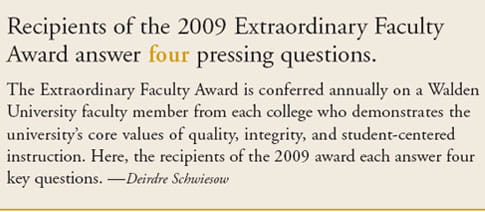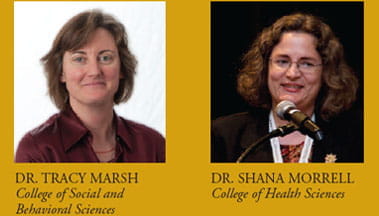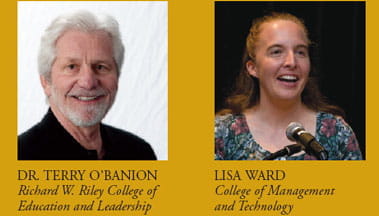What is the most exciting advancement happening in your field right now?
MARSH: Neuropsychology is advancing rapidly; that’s probably the most exciting area that impacts all of the specializations within the field. As we gain more opportunities to use technology to look at the brain—whether it’s through imaging or understanding how chemicals affect the brain—we have windows into information we didn’t have before.
MORRELL: In the field of environmental health, we are now integrating molecular and genetic biology with screening, monitoring, chemical toxicity testing, and risk assessment models. This is why it is so important for our graduates to have a basic understanding of human biology and genetics, such as it relates to common diseases and medical discoveries. The themes of biology and molecular and genetic information cut across many public health disciplines.
O’BANION: There’s no question about it: The most exciting development is the Obama administration allocating $12 billion to help community colleges improve student success rates. In addition to increased attention to persistence and graduation rates, we’ll also be able to use those funds to expand our role in training the workforce that will keep America competitive.
WARD: The most exciting thing happening right now is the use of broad wireless capabilities for continuous access to the Internet. Things are cheap enough that everyone can have access all the time, and it’s just amazing to watch technology change the way everyone operates.
What are the benefits of an advanced degree in your profession/field?
MARSH: The doctorate provides the most unlimited career options, particularly in a challenging economic climate. I tell my students that circumstances will change, so it’s better to get as much education in now rather than having doors closed down the road. Once you achieve your PhD, there’s a sense of tremendous accomplishment— it becomes a part of your identity and stays with you the rest of your life.
MORRELL: A Walden MPH will give you a knowledge base across the five areas of public health: environmental health, biostatistics, epidemiology, social and behavioral health, and public health administration. It’s really valuable for moving up the ladder, as is a PhD And with a PhD, you can teach at the university level, have more career advancement opportunities, and develop strong research skills.
O’BANION: The obvious benefits are increased opportunities for promotion and increased salaries. But I’m always amazed at the number of students in our program who spend time and money getting a degree for personal satisfaction—it gives them the opportunity to dive deep into an area of knowledge.
WARD: In engineering, a master’s degree allows students to specialize—that’s very important as far as the job market is concerned, because an entirely different subset of jobs opens up at that point. It can also give a bit of a salary increase and is important for a lot of engineers to have in terms of establishing expertise and having an impact in the field.
What is the main thing you hope students take away from your classes?
MARSH: Students are presented with information, some of which will be outdated in 10 to 15 years. Therefore, I’m invested in instilling critical thinking skills so that they can purposefully evaluate all new information, become lifelong learners, and remain active in their communities. When they earn those letters behind their name, they’ll be heard and will have a responsibility to effect social change.
MORRELL: I want to instill interest in environmental health and public health biology. What I’ve found is that a high percentage of students ultimately find environmental health fascinating—a lot of them say that they’re making personal changes as a result of something they’ve learned in the class about air quality, toxicants in their food and water, recycling, and so on. They tell me, “I’m going to go buy a radon detector.’”
O’BANION: I hope they take away my own commitment to making a difference in community colleges. If you make a difference in community colleges, you’re going to make a difference in the lives of many, many students in your community—and hopefully in American society.
WARD: What I feel like I really give them as an instructor is practice with communicating and applying the knowledge from the textbook. On the communication side: “How do you share information with a marketing person or a customer who needs to understand it?” And then on the application side: “Here is a specific situation—try it out.”
What is the greatest lesson your Walden students have taught you?
MARSH: They’ve taught me to continually challenge my own assumptions. They come with a tremendous amount of life experience, and always bring as much to the learning process as I do.
MORRELL: Perseverance. Walden students are dealing with more than most of us who went through a traditional program did, and yet they’re so excited and passionate about getting their degrees and making change in the world.
O’BANION: They have renewed my faith in the commitment of educators to make a difference in the world. Every one of my students is highly motivated and deeply committed. I think they’re the hope of the future, and that keeps me going. And that’s why I love working in the Walden program. It keeps me attuned and attached.
WARD: The biggest thing I’ve learned from my students is that everyone has experience and expertise that is in some way relevant to every class. You have the wealth of everyone else’s knowledge, too—not just yours.
Read about past Extraordinary Faculty Award recipients.






